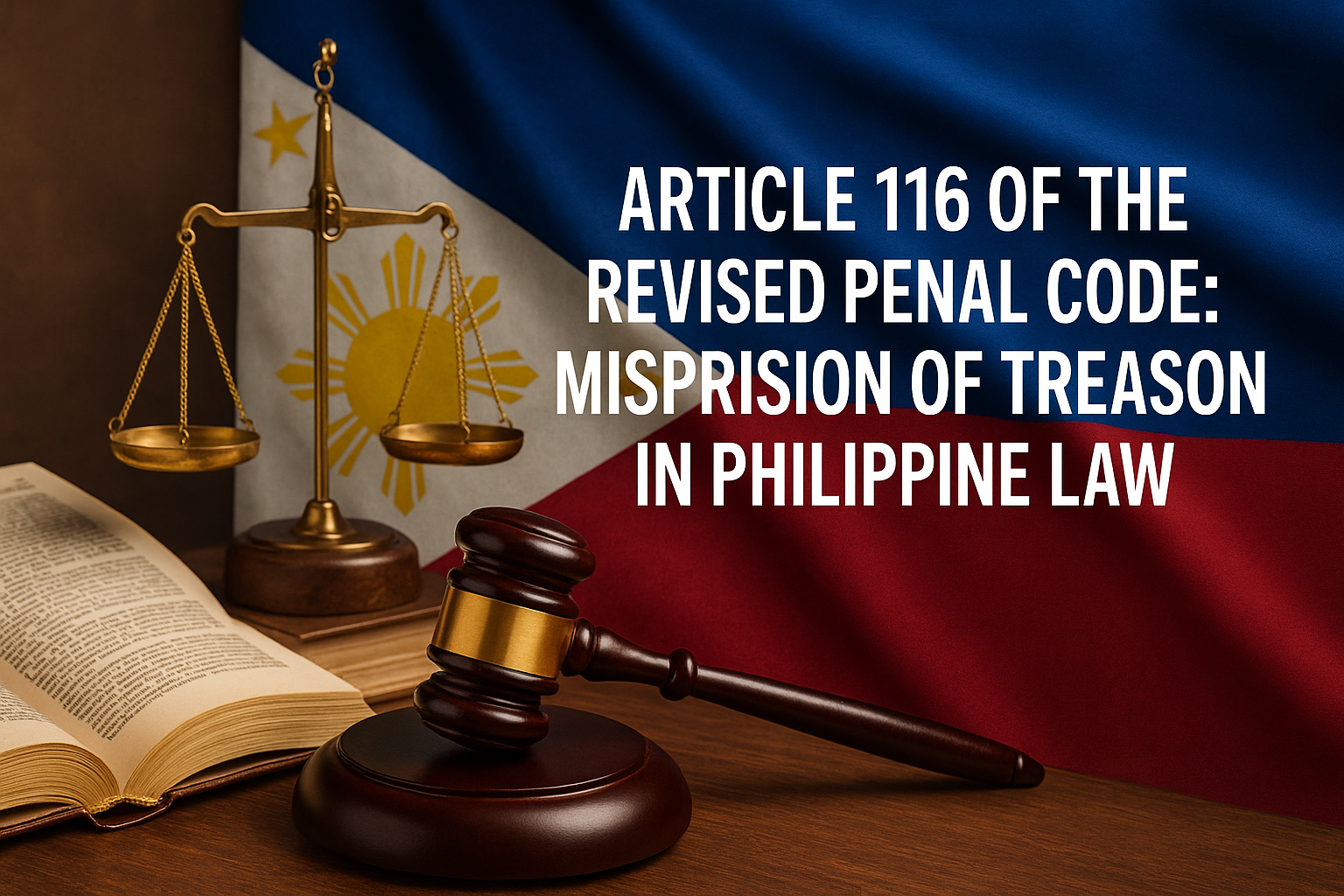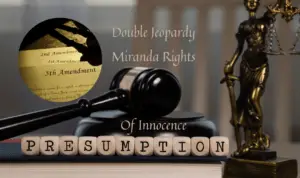The concept of misprision of treason is a unique and often misunderstood provision in Philippine criminal law. Found in Article 116 of the Revised Penal Code (RPC), Misprision of Treason in Philippine Law. This crime imposes a legal duty on persons owing allegiance to the government to report any knowledge of a conspiracy to commit treason. Failure to do so is itself a punishable offense. In this comprehensive article, we will explore the historical context, legal elements, penalties, and practical implications of misprision of treason in the Philippines. We will also examine relevant jurisprudence and discuss the continuing relevance of this law in the modern era.
Historical Background of Article 116
The crime of misprision of treason has its roots in the legal traditions of both Spain and the United States, reflecting the Philippines’ colonial history. The term “misprision” comes from English common law, where it referred to the concealment of a felony or treason by someone who was not a participant in the crime. In the Philippines, the concept was codified in the early 20th century and later incorporated into the Revised Penal Code of 1930.
The original context of Article 116 was to ensure the loyalty of citizens and residents to the government, especially during times of war or political instability. The provision was designed to prevent conspiracies against the state from going unreported, thereby safeguarding national security.
Misprision of Treason in Philippine Law | Elements
Let us begin by examining the exact wording of Article 116 of the Revised Penal Code:
“ART. 116. Misprision of treason.—Every person owing allegiance to the United States or the Government of the Philippine Islands, without being a foreigner, and having knowledge of any conspiracy against them, who conceals or does not disclose and make known the same, as soon as possible to the governor or fiscal of the province, or the mayor or fiscal of the city in which he resides, as the case may be, shall be punished as an accessory to the crime of treason.”1
Key Elements
To secure a conviction for misprision of treason, the prosecution must establish the following elements:
- The offender owes allegiance to the government (i.e., is a Filipino citizen or resident, not a foreigner).
- The offender has knowledge of a conspiracy to commit treason.
- The offender conceals or does not disclose and make known the same.
- The disclosure must be made as soon as possible to the proper authorities (governor or fiscal of the province, or mayor or fiscal of the city).
Who May Be Liable: Persons Owing Allegiance
Article 116 specifically applies to “every person owing allegiance to the United States or the Government of the Philippine Islands, without being a foreigner.” In the current context, this means Filipino citizens and residents who are not foreigners.
Allegiance Defined
Allegiance refers to the duty of fidelity and obedience which a citizen or subject owes to the state or sovereign under whose protection he lives. In the Philippine setting, this means all Filipino citizens, whether by birth or naturalization, and possibly permanent residents, depending on the circumstances.
Exclusion of Foreigners
Foreigners are expressly excluded from liability under Article 116. This is logical, as the duty to report conspiracies against the government is a function of allegiance, which foreigners do not owe.
The Duty to Report: Scope and Limitations
A central feature of misprision of treason is the duty to report. The law requires that any person with knowledge of a conspiracy to commit treason must disclose this information “as soon as possible” to the proper authorities.
What Must Be Reported?
Knowledge of a conspiracy to commit treason: The law does not require knowledge of an actual act of treason, but only of a conspiracy to commit it. A conspiracy exists when two or more persons come to an agreement concerning the commission of a felony and decide to commit it.
To Whom Must Disclosure Be Made?
The law specifies the governor or fiscal of the province, or the mayor or fiscal of the city where the person resides.
Timeliness of Disclosure
The phrase “as soon as possible” imposes a sense of urgency. Delay in reporting may be construed as concealment, making the person liable.
Limitations
The law does not require the person to take any action to prevent the commission of treason, only to report the conspiracy.
The person must have actual knowledge, not mere suspicion.
Penalties for Misprision of Treason
Article 116 provides that the offender “shall be punished as an accessory to the crime of treason.” This means that the penalty is not as severe as that for the principal crime of treason, but it is still significant.
Penalty for Treason
Under Article 114 of the Revised Penal Code, as amended by RA 10951 (2017):
“Any Filipino citizen who levies war against the Philippines or adheres to her enemies, giving them aid or comfort within the Philippines or elsewhere, shall be punished by reclusion perpetua to death and shall pay a fine not to exceed Four million pesos (P4,000,000).”2
Penalty for Accessory
An accessory to treason is punished by a penalty two degrees lower than that prescribed for the principal. Thus, if the principal penalty is reclusion perpetua to death, the accessory may be punished by prision mayor (6 years and 1 day to 12 years) or prision correccional (6 months and 1 day to 6 years), depending on the circumstances.
Comparison with Treason and Other Related Crimes
Treason (Article 114)
Treason is the most serious crime against national security. It involves levying war against the government or adhering to its enemies, giving them aid or comfort. The penalty is severe, reflecting the gravity of the offense.
Conspiracy and Proposal to Commit Treason (Article 115)
Article 115 punishes conspiracy and proposal to commit treason, even if the crime itself is not consummated. The penalties are lower than for consummated treason but higher than for misprision.
Misprision of Treason (Article 116)
Misprision of treason is distinct in that the offender does not participate in the conspiracy or the act of treason itself but merely fails to report it. The law recognizes the moral culpability of silence in the face of a threat to national security.
Accessories in General (Article 19)
The Revised Penal Code defines an accessory as one who, not being a principal or accomplice, participates after the commission of the crime by:
- Profiting from the effects of the crime,
- Concealing or destroying evidence,
- Harboring or assisting the principal.
In the case of misprision of treason, the accessory liability arises from concealment or failure to report.
Jurisprudence on Misprision of Treason
While there is limited modern jurisprudence specifically on misprision of treason, the Supreme Court has discussed the nature of accessories and the application of penalties in related cases.
Definition of Accessory
In People vs. Antonio (2000), the Supreme Court explained:
“The Revised Penal Code in Article 19 defines an accessory as one who has knowledge of the commission of the crime, yet did not take part in its commission as principal or accomplice, but took part in it subsequent to its commission by any of three modes: (1) profiting himself or assisting the offender to profit by the effects of the crime; (2) concealing or destroying the body of the crime, or the effects or instruments thereof in order to prevent its discovery; and (3) harboring, concealing, or assisting in the escape of the principals of the crime, provided the accessory acts with abuse of his public functions or when the offender is guilty of treason, parricide, murder, or an attempt to take the life of the Chief Executive, or is known to be habitually guilty of some other crime.”3
This definition is relevant because misprision of treason is a form of accessory liability, specifically for concealment.
Exclusion from Indeterminate Sentence Law
In People vs. Concepcion (2012), the Supreme Court noted:
“This Act shall not apply to persons convicted of offenses punished with death penalty or life-imprisonment; to those convicted of treason, conspiracy or proposal to commit treason; to those convicted of misprision of treason, rebellion, sedition or espionage…”4
This means that those convicted of misprision of treason are not eligible for the benefits of the Indeterminate Sentence Law, reflecting the seriousness with which the law treats this offense.
Practical Implications and Modern Relevance
National Security and Civic Duty
Misprision of treason underscores the importance of civic duty in the protection of national security. The law imposes a positive obligation on citizens to report threats against the state, recognizing that silence can be as dangerous as active participation in a conspiracy.
Challenges in Enforcement
In practice, prosecutions for misprision of treason are rare. This may be due to the difficulty of proving actual knowledge of a conspiracy and the subjective nature of “as soon as possible” reporting. Nevertheless, the law remains a powerful tool for the government in times of crisis.
Modern Context
With the rise of terrorism, cyber threats, and transnational conspiracies, the principles underlying misprision of treason remain relevant. The duty to report threats to national security is as important today as it was in the past, even as the forms of conspiracy evolve.
Final Thoughts
Article 116 of the Revised Penal Code, or misprision of treason, is a testament to the Philippine legal system’s commitment to national security and civic responsibility. By criminalizing the concealment of conspiracies to commit treason, the law seeks to ensure that all persons owing allegiance to the government act as guardians of the state. While prosecutions may be rare, the existence of the law serves as a reminder of the duties that come with citizenship.
Understanding misprision of treason is essential for legal practitioners, law students, and all citizens who wish to appreciate the balance between individual rights and collective security. As the Philippines continues to face new and evolving threats, the principles enshrined in Article 116 remain a cornerstone of the nation’s legal framework.
Frequently Asked Questions (FAQs)
What is misprision of treason?
Misprision of treason is the crime committed by a person who, owing allegiance to the government, has knowledge of a conspiracy to commit treason and fails to report it to the proper authorities as soon as possible. The offender is punished as an accessory to treason.
Who can be charged with misprision of treason?
Only persons owing allegiance to the Philippines (i.e., Filipino citizens and residents, not foreigners) can be charged with misprision of treason.
What is the penalty for misprision of treason?
The penalty is that of an accessory to treason, which is two degrees lower than the penalty for the principal crime of treason. This typically means prision mayor or prision correccional, depending on the circumstances.
Is misprision of treason still relevant today?
Yes. While prosecutions are rare, the law remains in force and is relevant in the context of national security, especially in times of war or political instability.
Are there any notable cases on misprision of treason?
sThere is limited modern jurisprudence specifically on misprision of treason, but the Supreme Court has discussed the nature of accessories and the application of penalties in related cases such as People v. Antonio (2000) and People vs. Concepcion (2012).




